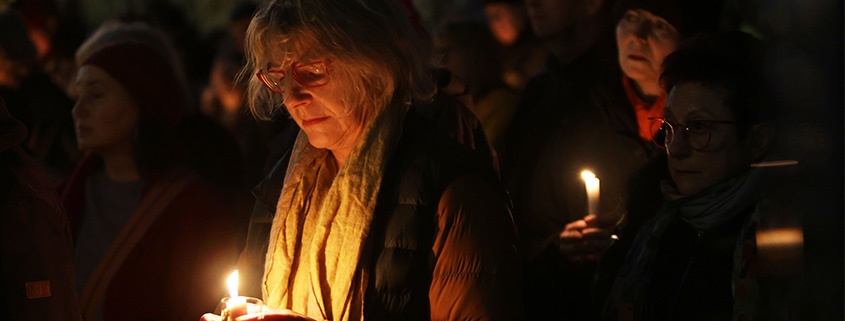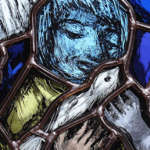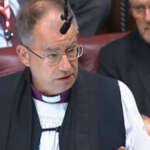I love the beatitudes, the eight beautiful sayings of Jesus which Matthew sets at the head of the Sermon on the Mount. They offer a powerful portrait of Jesus; they offer a template for the character of the Church and what it means to be saints together (which is why this passage is the gospel for All Saints; and they offer together a vision for the best of what it means to be human.
But there is one beatitude which stands out as we listen to these familiar and lifegiving words of Jesus this Sunday. The seventh.
Blessed are the peacemakers for they shall be called children of God.
I wonder where your mind goes as you hear that text. Our news feeds have been filled for four weeks now with the devastating images of war in Israel and in Gaza: scenes which break our hearts daily and stretch the limits of our compassion. We lament that war is not confined to our memories of past conflict, important though these are, but a present lived reality in places where we have visited and affecting people we may know and love.
When we hear the words peacemakers my mind is drawn to Anthony Blinken, or James Cleverly, or King Hassan of Jordan, shuttling between countries looking for a fragile opportunity which might lead to a just and lasting peace.
But of course, peace and peacemaking involves much more than this. Peace is one of deepest, richest, broadest words in the whole of the Bible. The Hebrew word is shalom. Shalom – peace-making – is the inheritance and the vocation of all the saints – of every person in this church today. Peace is our inheritance and our calling. Shalom is a shorthand for the whole vision of the kingdom of God: a world where God’s will is done on earth as in heaven. Shalom is what we pray for each time we say the Lord’s Prayer.
Peace is far more than a truce: an absence of conflict, violence and war. Peace is the presence of human flourishing, of well being, of harmony, of lives well lived from childhood to old age. Shalom describes the world we long for; the world we pray for Sunday by Sunday; the world each of us is trying to build.
The whole world is searching for peace first and foremost in our hearts. Living in a world of conflict and deep questions is not easy. We all worry. We worry about what we wear; what we will eat; what others think; we are anxious about the great questions of the day. We long for peace. Jesus promises that peace: reconciliation with God and reconciliation one with another; reconciliation for the whole world. Jesus calls us to be channels of that peace to each other and to the world.
We live in what can seem vexed and troubled times for God’s church as we wrestle with deep questions of what it means to be human, of sexuality, of our interpretation and reading of the scriptures. Sometimes it seems as though these questions may divide us. Churches (like all human communities) have a spectacular capacity to disagree about big questions and small ones. Many a PCC has fallen out over the colour of the buckets in the church hall or what kind of coffee to serve.
But Jesus draws us back to peacemaking at the heart of our lives. We are called to pursue all that makes for peace. With Jesus help we can navigate these questions and hold together.
We are called especially in these days to live in peace and harmony with creation. The greed and ignorance of generations has dislocated humanity’s relationship with nature and the climate. Shalom – peace and well being – is not just for humanity as part of creation. It is for badgers and kingfishers and orcas and seals; for bees and hedgehogs and wildflowers. The responsibility for shalom in creation rests now in our hands. The careful ecological work that you and others are doing is peacemaking.
We are called to seek peace in the villages, towns and cities where we live. There is the potential at present that terrible conflicts in distant places will fracture our own communities here in the Thames Valley. The rise in antisemitism and hate crime against Muslims is deeply concerning. I met with a group of faith and community leaders for a second time recently to explore the impact of the war in Israel and Gaza on communities in Oxfordshire.
We decided at very short notice to hold a united vigil for peace in central Oxford. Together as Jews and Muslims, Hindus, Buddhists, Sikhs and others we are seeking peace and building on deep friendships to extend healing our communities.
And we are called finally to seek peace of course in international relationships and healing from the memories of war. The work of reconciliation continues for generations after conflict as we will remember especially on Armistice Day and with Acts of Remembrance next Sunday in all our churches.
Blessed are the peacemakers for they shall be called children of God.
Christ the Son of God who speaks these words is the peacemaker. Christ makes peace through his own blood shed on the cross. Christ opens the space for peace between the nations of the world calling us into a single humanity. Christ comes to us as the Prince of Peace. Christ calls for the beating of swords into ploughshares and spears into pruning hooks. Christ offers to all our troubled, weary souls, the gift of peace which passes understanding.
Christ the Son of God offers to all peacemakers the opportunity to know that we are the children of God.
Peace making is our inheritance and peace making is our vocation.
And all of this is remembered Sunday by Sunday in our worship as we say to one another – as we will do each Sunday – the peace of the Lord be always with you.
+Steven
This is an edited extract of a sermon given at St Edburg’s, Bicester on Matthew 5.9, 5 November 2023
- View the photo gallery of the Vigil for Peace
- Watch a recording of the Vigil for Peace
- View the BBC South news report of the Vigil for Peace



